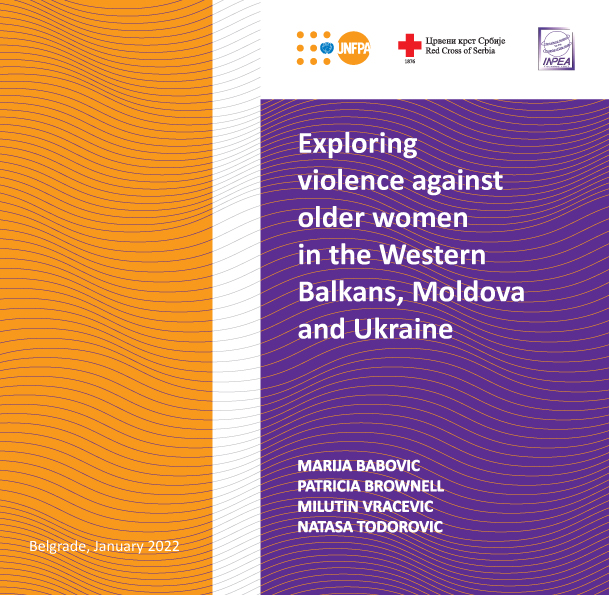- resources
- publications
- exploring violence against older women in the western balkans, moldova and ukraine
Exploring violence against older women in the Western Balkans, Moldova and Ukraine

With support provided by the United Nations Population Fund (UNFPA), the Red Cross of Serbia worked with international experts on preparing the report on the results of the research “Exploring Violence Against Older Women in the Western Balkans, Moldova and Ukraine”. This study presents the prevalence, characteristics, and consequences of gender-based violence against older women, as well as the extent to which they seek help from community-based systems of support and how these systems respond to their help-seeking. The research findings presented here are based on both quantitative and qualitative research methods. In 2018, the Organization for Security and Cooperation in Europe (OSCE) conducted a prevalence study on intimate partner and non-partner violence against girls and women of all ages. The Survey on the Well-being and Safety of Women was conducted in Albania, Bosnia and Herzegovina, Montenegro, North Macedonia, Serbia, Moldova, Ukraine, and Kosovo*, with the goal of providing comparable data on different forms of violence women experience in their childhood and throughout their life course. It included representative samples of women aged 18-74 in each country/territory.
The purpose of this report is to describe experiences of gender-based violence reported by older women (ages 65-74) in the region of Southeast and Eastern Europe. The study on which the report is based captures the most recent experiences of violence (within the past 12 months of the survey interview) against older women as well as their lifetime experiences with intimate partner and non-partner violence, both as adults and as children. Accumulated disadvantages including experiences of violence during a woman’s lifetime strongly influence overall health and wellbeing in older age, particularly when understood in the context of this stage in the life course. The age of 65 was selected as the start of old age for the purposes of this report because it is the legal age of retirement in the countries from which the study sample was drawn.
The research report presents the prevalence of this type of violence, the frequent perpetrators, risk factors, consequences of violence and reasons for reporting or not reporting. The authors of the report also provided recommendations for public policy improvements based on the results.
The study shows that 16.7% of women over the age of 65 have experienced violence in the last 12 months. For many of them, this is a continuation of the violence they have suffered during the course of their lives, because the research also shows that 56.2% of women over the age of 65 have experienced some form of violence since they were 15.
The authors of this publication would like to express their gratitude to the OSCE Mission to Serbia and OSCE Secretariat, in Vienna for making the database from research on the safety and well-being of women in Southeast and Eastern Europe, conducted in 2018, available for analysis. The data provided insight into the prevalence of violence against older women, but also helped identify the shortcomings and limitations when collecting data on this age group.
* This designation is without prejudice to positions on status and is in line with UN Security Council Resolution 1244/1999 and the Opinion of the International Court of Justice on Kosovo's declaration of independence.
The research report authors
Prof. dr. Marija Babovic, The Faculty of Philosophy, University of Belgrade
Prof. dr. Patricia Brownell, Fordham University, New York,
Dr. Milutin Vracevic, Red Cross of Serbia
Natasa Todorovic, Red Cross of Serbia
